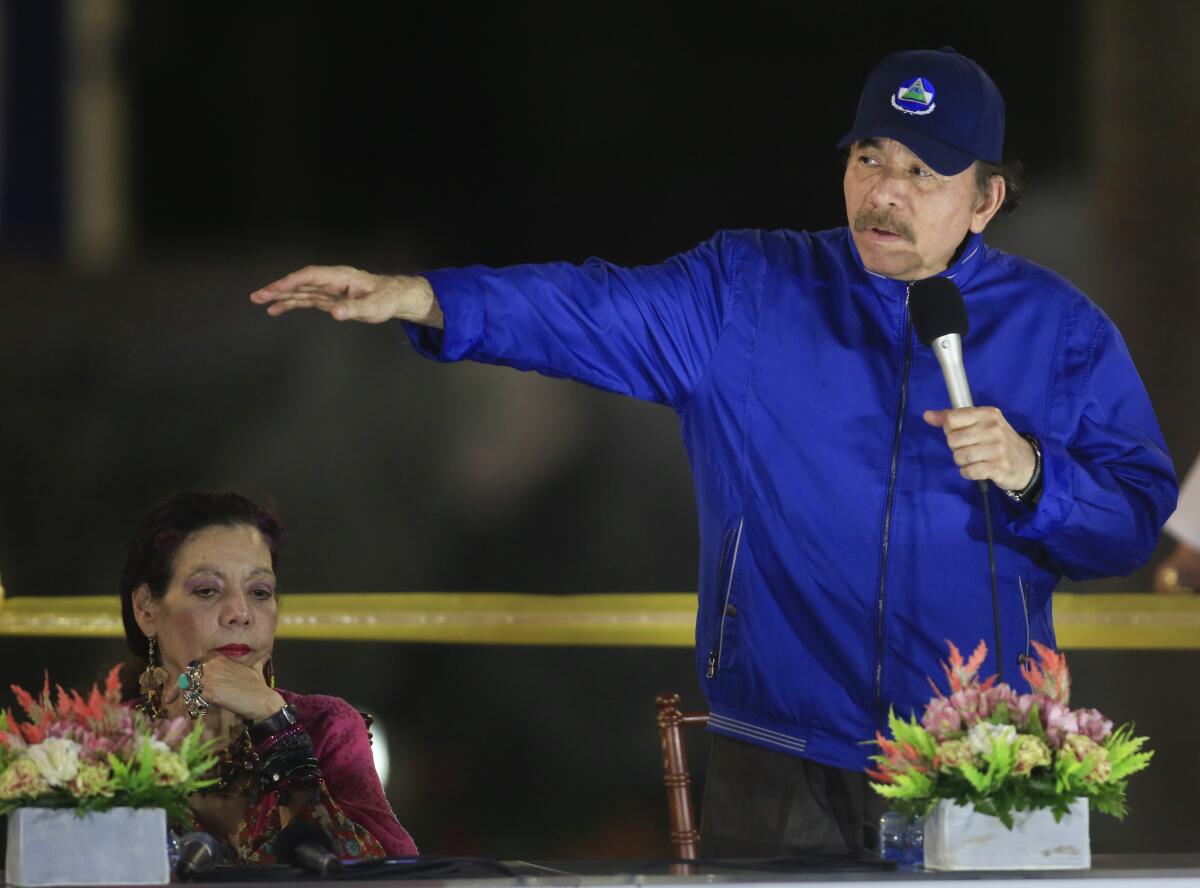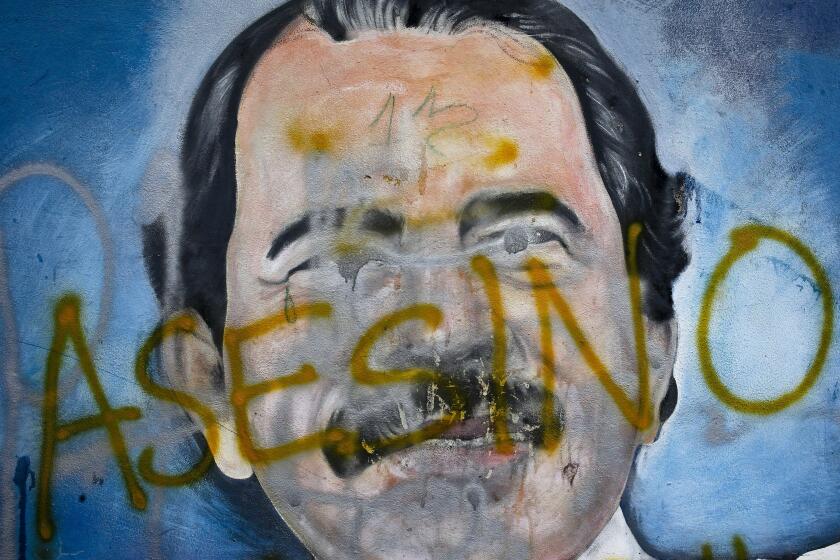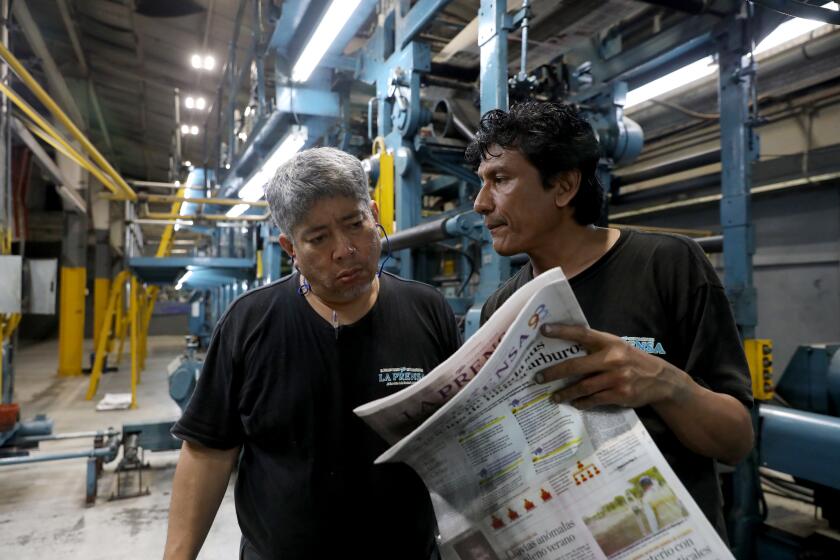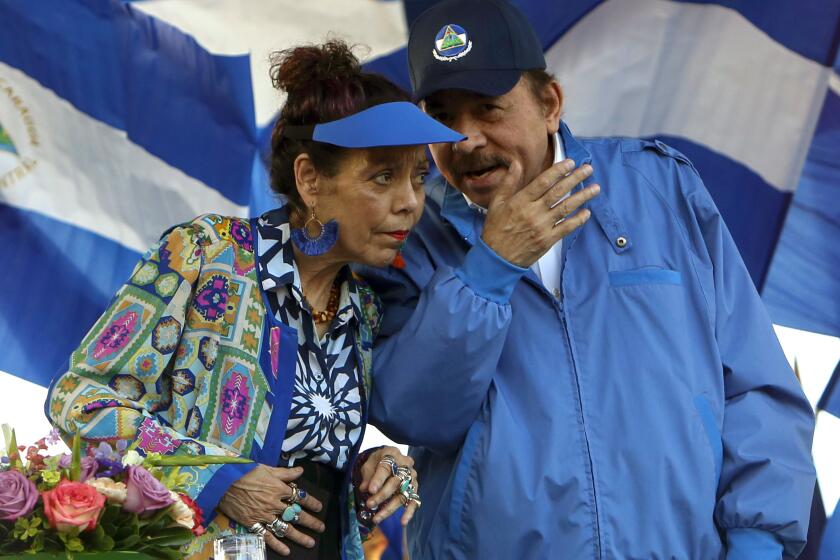Calls for more pressure on Nicaragua as former first lady put under house arrest

- Share via
MANAGUA, Nicaragua — An international human rights organization is calling for increased pressure on Nicaraguan President Daniel Ortega as arrests of opposition figures — including the nation’s former first lady — continue ahead of Nov. 7 elections.
Human Rights Watch plans to release a report Tuesday detailing the politically motivated arrests in recent weeks of nearly 20 opposition figures, prominent businesspeople, former government officials and political leaders. The Associated Press received a copy of the report in advance.
The organization calls on the United Nations Security Council to invoke Article 99 of its charter “to raise this issue in the U.N. Security Council and present it as a growing crisis involving grave human rights abuses which could undermine stability in the region.”
Ortega is seeking a fourth consecutive term as president and has been systematically clearing his path of potential challengers through arrests for alleged crimes against the state. The government had already significantly reduced the public space for the opposition to maneuver through repressive laws and intimidation.
“High-profile arrests and other serious human rights violations against critics appear to be part of a broader strategy to eliminate political competition, stifle dissent and pave the way for President Daniel Ortega’s reelection to a fourth consecutive term,” Human Rights Watch said.
Late Monday, Nicaragua police announced they had placed former First Lady María Fernanda Flores Lanzas, the wife of former President Arnoldo Aleman, under house arrest for alleged crimes against the state.
Nicaragua’s Congress has passed a law that would essentially ban opposition candidates from running in the 2021 presidential elections.
There was no mention of Aleman or his whereabouts. The police statement said his wife would remain under guard while the allegations against her were investigated.
Also Monday, journalist Carlos Fernando Chamorro, son of former President Violeta Barrios de Chamorro, said via Twitter that police had raided his home. He demanded they respect the well-being of his sister-in-law and others with her.
“They will not be able to silence journalism,” he wrote. In May, police raided the offices of his online news outlet Confidencial. The government seized the outlet’s old offices in December 2018.
Earlier, Nicaraguan writer and former Vice President Sergio Ramírez said there was no chance of free and fair elections in Nicaragua and that the opposition should refuse to participate in voting that would only legitimize Ortega’s victory.
Nicaraguan President Daniel Ortega has carried out a war on the press, jailing journalists and closing news outlets. In a blow to the storied La Prensa newspaper, he barred delivery of newsprint and ink.
Last week, most members of the Permanent Council of the Organization of American States condemned the Nicaraguan government’s actions and called for the immediate release of political prisoners. On Monday, Argentina and Mexico, two countries that had abstained from the vote, recalled their ambassadors from Nicaragua for consultation over the new developments.
Earlier this month, the U.S. Treasury Department slapped sanctions on Ortega’s daughter and a top army official, as well as several others close to the president.
“The gravity and intensification of the Ortega government’s brutal crackdown on critics and members of the opposition in recent weeks requires a redoubling of international pressure,” said José Miguel Vivanco, Americas director at Human Rights Watch.
The report noted that more than 108,000 Nicaraguans have fled the country since street protests began in April 2018 and were violently put down by the government. The Inter-American Commission on Human Rights found that 328 people were killed and some 2,000 wounded. Ortega has maintained that those protests were a foreign-backed coup attempt.
Nicaragua has created a new National Ministry for Extraterrestrial Space Affairs, The Moon and Other Celestial Bodies, which is drawing amused reactions on social media in a nation that has been struggling since anti-government protests in 2018.
Most of the arrests in recent weeks have been related to allegations that opposition figures accepted foreign financing for activities against the government.
Even before the latest crackdown, more than 100 political prisoners were already jailed in Nicaragua, the report said. Among them, Human Rights Watch has documented three cases of women who suffered assault and sexual aggression during their imprisonment.
In developing the report, Human Rights Watch interviewed 53 people in Nicaragua, including 46 activists, lawyers, journalists, human rights defenders and opposition figures who were victims of harassment of arbitrary detention. It said the government had not responded to its request for information on those cases.
Government targets frequently report police vehicles parked outside their homes that prevent them from leaving.
“There is virtually no chance Nicaraguans can exercise their fundamental rights to freedom of expression, assembly and association, nor to vote and run for public office, if they are seen as opposing the ruling party,” Vivanco said. “Top U.N. officials and U.N. member countries that care about human rights have an opportunity to prevent a regional crisis by pressuring Ortega to end his repression now. They should seize it.”
More to Read
Sign up for Essential California
The most important California stories and recommendations in your inbox every morning.
You may occasionally receive promotional content from the Los Angeles Times.













